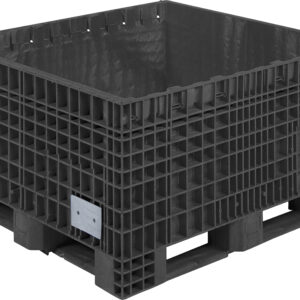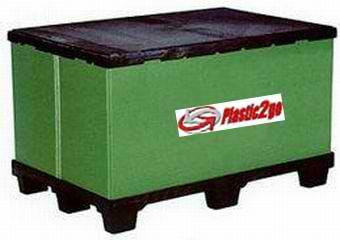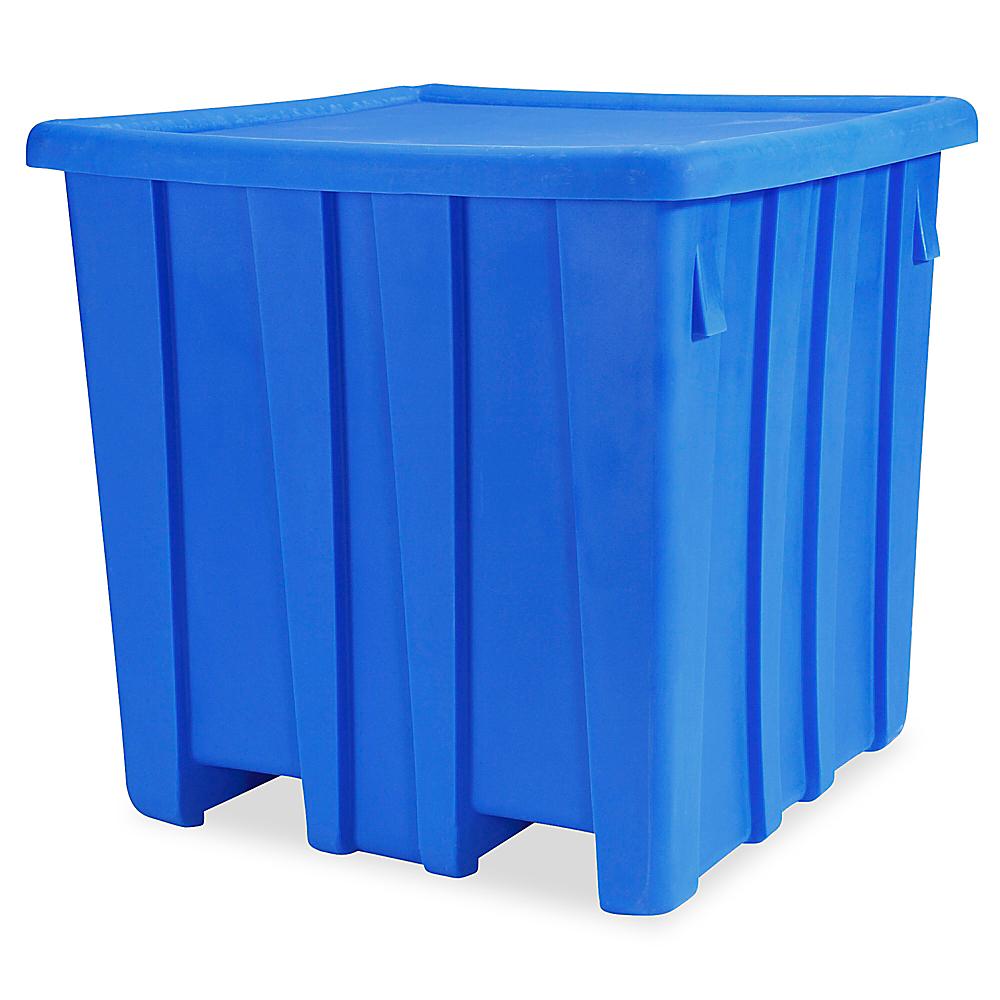A Comprehensive Overview to the Various Kinds Of Bulk Plastic Containers Available Today
Bulk plastic containers play an essential duty in various sectors, offering services for storage and transportation. Their diverse kinds satisfy different requirements, from stiff alternatives for strong materials to flexible containers fitting various forms. Each type offers distinctive benefits, making it essential to comprehend their attributes and applications. As sectors develop, so do the demands for effective container options. What elements should one think about when picking the ideal bulk container?
Introduction of Mass Plastic Containers

Sorts Of Bulk Plastic Containers
Bulk plastic containers been available in different types, each matched to particular applications. Stiff bulk containers, adaptable bulk containers, and intermediate mass containers represent the key classifications, each offering one-of-a-kind advantages. Recognizing these kinds is vital for selecting the appropriate container for carrying and storing products.

Inflexible Bulk Containers
Inflexible mass containers are vital for efficient storage space and transport of various products across markets. These containers are usually constructed from long lasting plastics, enabling them to withstand extreme handling and ecological conditions. They can be found in different forms and sizes, consisting of totes, drums, and bins, making them ideal for keeping every little thing from granular compounds to liquids. Inflexible containers usually include reinforced walls and safe and secure covers, making certain the contents stay shielded during transit. Their stackable design maximizes storage room, making them perfect for stockrooms and manufacturing facilities. In addition, lots of rigid bulk containers are recyclable and reusable, adding to sustainability efforts. Overall, their toughness and versatility make rigid mass containers a crucial part in supply chain operations.
Flexible Bulk Containers
Adaptable bulk containers, often referred to as versatile intermediate bulk containers (FIBCs), function as a versatile solution for storing a variety and transferring of dry materials. These containers are typically made from woven polypropylene and are developed to be light-weight yet solid, permitting effective handling and stacking. Their versatility enables them to fit different sizes and shapes, making them suitable for items varying from grains to chemicals. FIBCs can be outfitted with features such as spouts for easy dental filling and discharge, along with safety coverings for enhanced longevity. In addition, they are recyclable and recyclable, adding to sustainable techniques in sectors like farming, food handling, and building. Overall, adaptable mass containers supply a cost-effective and effective option for mass material monitoring.
Intermediate Mass Containers
Intermediate bulk containers (IBCs) are vital for the reliable transportation and storage space of fluids and granular products throughout different industries. These containers generally have an ability ranging from 275 to 330 gallons and are developed for simple stacking and managing. Made from resilient materials like high-density polyethylene or steel, IBCs offer exceptional security against contamination and environmental factors. Their design includes functions such as a built-in pallet for forklift access and a removable top for very easy dental filling and cleaning. IBCs are widely used in chemical, food, and pharmaceutical sectors, ensuring conformity with safety and security laws. Their adaptability and reusability make them a cost-effective service for bulk storage and transportation, adding to supply chain efficiency and sustainability.
Attributes and Advantages of Bulk Plastic Containers
Bulk plastic containers are important tools in various sectors, supplying a mix of durability and usefulness. These containers are constructed from premium products, making them resistant to impacts, chemicals, and ecological variables. This effectiveness assurances product safety and security throughout storage and transport.
Furthermore, mass plastic containers are lightweight, facilitating convenience of lowering and managing delivery expenses. Their stackable layout maximizes storage effectiveness, enabling enhanced warehouse area. Many designs feature safe covers or closures, providing a closed seal that preserves materials and avoids contamination.
Moreover, mass plastic containers are commonly reusable and recyclable, adding to lasting practices. Their flexibility permits a wide variety of applications, from food storage space to industrial use, boosting their worth throughout markets. Businesses profit from the long life expectancy and reduced upkeep needs of these containers, making them an economical option for both long-lasting and temporary demands.
Industries That Make Use Of Mass Plastic Containers
Various industries benefit from making use of bulk plastic containers, each leveraging their special residential properties for details applications. The food and drink sector depends on these containers for secure storage space and transportation of items, while the chemical manufacturing industry utilizes them for dealing with dangerous materials. Furthermore, the pharmaceutical distribution needs stress the importance of sturdiness and tidiness in product packaging remedies.
Food and Drink Market
As the demand for safe and efficient storage services proceeds to increase, the food and beverage industry increasingly relies upon mass plastic containers for their functional needs. These containers supply durable, light-weight, and versatile alternatives for saving components, completed items, and waste materials. Made from food-grade products, they ensure compliance with health and safety and security requirements. Different styles, such as stackable containers and carry boxes, optimize room during transport and storage, improving logistical effectiveness. Additionally, the openness of some bulk containers permits simple supply administration, decreasing the risk of wasting. With the market's emphasis on sustainability, lots of producers are currently supplying recyclable and recyclable choices, straightening with environment-friendly methods while satisfying the high demands of food security and hygiene.
Chemical Production Market
The chemical production industry relies heavily on mass plastic containers for the effective and safe storage of basic materials, intermediates, and finished products. These containers are made to endure numerous chemicals, guaranteeing that harmful materials do not leakage or degrade the container itself. Typical types consist of high-density polyethylene (HDPE) and polypropylene containers, which use outstanding chemical resistance and toughness. Their lightweight nature and stackable layout facilitate transportation and storage, enhancing space in producing centers. Additionally, numerous mass plastic containers feature attributes such as tamper-evident seals and easy-to-read labeling, enhancing safety and compliance with sector policies. In general, mass plastic containers are integral to the chemical manufacturing process, supplying reputable remedies for handling diverse substances.
Pharmaceutical Distribution Needs
Drug distribution relies upon mass click over here now plastic containers to fulfill rigorous safety and security and governing needs. These containers are crucial for delivering and saving a selection of pharmaceutical items, including active pharmaceutical ingredients (APIs) and ended up drugs. Their design assurances security against contamination, wetness, and light, preserving the stability of delicate products. Furthermore, bulk plastic containers are compliant with sector criteria such as Excellent Manufacturing Practices (GMP) and are commonly made from materials that are FDA-approved. Using these containers improves efficiency in the supply chain, enabling secure, large distribution while minimizing waste. Firms in the pharmaceutical market prioritize the use of sturdy, watertight, and tamper-evident containers to assure product safety and security and high quality throughout the logistics process.
Factors to consider for Selecting the Right Container
When selecting the appropriate bulk plastic container, different variables must be thoroughly weighed to assure excellent performance and safety. The nature of the materials to be saved is paramount; compatibility with the container's material can affect stability and safety. Bulk Plastic Containers. Additionally, the container's size and shape have to line up with the storage space and transportation demands, guaranteeing efficient area utilization
Tons capacity is one more vital consideration, as it needs to accommodate the weight of components without threat of damages or failure. The style attributes, such as venting or lids, can impact functionality and access. Compliance with sector regulations is necessary, specifically in sectors like pharmaceuticals, where safety and security criteria are strict.
Ultimately, the expected life expectancy and resilience of the container must be assessed to verify it fulfills the operational requirements without frequent replacement. By reviewing these elements, one can choose the most appropriate mass plastic container for certain applications.
Environmental Effect and Sustainability
As organizations increasingly prioritize sustainability, the environmental impact of bulk plastic containers has come under scrutiny. These containers, often made from materials such as polyethylene or polypropylene, add greatly to plastic waste otherwise handled appropriately. Their manufacturing includes the usage of fossil fuels, which can cause boosted greenhouse gas discharges. Advancements in recycling modern technology and the growth of naturally degradable alternatives are assisting to reduce these concerns.
Several producers are adopting techniques that emphasize the usage of recycled materials, thereby minimizing the demand for virgin plastics. The durability of mass plastic containers also contributes; they are developed to be recycled several times, which can lessen their total environmental impact when compared to single-use choices. Ultimately, the market faces the obstacle of stabilizing performance with environmental obligation, making sustainable practices vital for the future of mass plastic containers.
Best Practices for Storage and Transport
Reliable storage space and transport of mass plastic containers substantially affect both functional effectiveness and sustainability. To make the most of area, companies should stack containers firmly, guaranteeing stability and protecting against damage. Correct labeling is essential for simple recognition, which streamlines retrieval processes. In addition, preserving a clean and orderly storage space area decreases the danger of contamination and boosts safety.
For transport, selecting the appropriate vehicle is essential; containers should be secured to prevent moving during transportation. Firms need to additionally consider using pallets to help with simpler loading and dumping. Routine inspections of containers for wear and tear can avoid pricey replacements.
Temperature control is another essential aspect, as extreme conditions can compromise the integrity of the plastic. Lastly, training personnel on best practices for dealing with and transportation assurances compliance and promotes a society of safety and security. By executing these best practices, businesses can enhance their functional performance while adding to ecological sustainability.
Often Asked Inquiries
How Do I Clean Bulk Plastic Containers Successfully?
To tidy mass plastic containers successfully, one should wash them with cozy water, utilize a mild cleaning agent and scrub with a soft brush. Rinse extensively, after that enable to air completely dry completely before storage space or reuse.
What Is the Lifespan of Mass Plastic Containers?
The lifespan of mass plastic containers generally varies from 5 to ten years, depending on the material, use, and environmental problems. Appropriate maintenance and storage can greatly expand their use and toughness in time.
Can Bulk Plastic Containers Be Custom-made?

Do Mass Plastic Containers Have Warranty Options?

Exist Laws for Using Bulk Plastic Containers?
Yes, laws exist for making use of bulk plastic containers, mainly concentrated on safety, environmental influence, and product compliance. These regulations assure that containers satisfy market standards basics and appropriate for transporting numerous compounds safely and successfully.
Inflexible bulk containers, flexible mass containers, and intermediate bulk containers represent the primary groups, each offering distinct advantages. Flexible mass containers, usually referred to as adaptable intermediate bulk containers (FIBCs), serve as a flexible option for delivering and keeping a variety of dry materials. The chemical production market depends heavily on bulk plastic containers for Visit Your URL the secure and reliable storage space of raw products, intermediates, and ended up products. plastic bulk containers. These containers are developed to hold up against different chemicals, guaranteeing that hazardous products do not leak or weaken the container itself. Furthermore, mass plastic containers are compliant with sector requirements such as Excellent Production Practices (GMP) and are frequently made from products that are FDA-approved